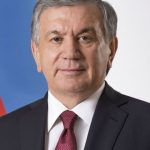Politics
Uzbekistan Politics
This page explores Uzbekistan’s political structure incorporating real-time RSS feed news and videos. By harnessing the power of RSS feeds, visitors can stay informed about the latest developments in Uzbekistan’s politics as they happen. The dynamic nature of these feeds ensures that users receive up-to-the-minute updates on political events, policy changes, and significant milestones, enabling them to stay abreast of the ever-evolving political scene.

Shavkat Miromonovich Mirziyoyev
2nd President of Uzbekistan
Incumbent
Assumed office
14 December 2016
Acting: 8 September 2016 – 14 December 2016
Image credit
The Republic of Uzbekistan is a presidential constitutional republic, whereby the President of Uzbekistan is head of state. Executive power is exercised by the government and by the Prime Minister of Uzbekistan. Legislative power is vested in the two chambers of the Oliy Majlis, the Senate and the Legislative Chamber. The judicial branch (or judiciary), is composed of the Supreme Court, Constitutional Court, and Higher Economic Court that exercises judicial power.
The movement toward economic reform in Uzbekistan has not been matched by a movement toward political reform. The government of Uzbekistan has instead tightened its grip since independence (September 1, 1991), cracking down increasingly on opposition groups. Although the names have changed, the institutions of government remain similar to those that existed before the breakup of the Soviet Union. The government has justified its restraint of public assembly, opposition parties, and the media by emphasizing the need for stability and a gradual approach to change during the transitional period, citing the conflict and chaos in the other former republics (most convincingly, neighbouring Tajikistan). This approach has found credence among a large share of Uzbekistan’s population, although such a position may not be sustainable in the long run.
Despite the trappings of institutional change, the first years of independence saw more resistance than acceptance of the institutional changes required for democratic reform to take hold. Whatever initial movement toward democracy existed in Uzbekistan in the early days of independence seems to have been overcome by the inertia of the remaining Soviet-style strong centralized leadership.
Unless other sources are listed, original content is provided by ChatGPT. ChatGPT may produce inaccurate information about people, places, or facts. #Uzbekistan #UzbekistanPolitics #UzbekistanNews #UzbekistanNewsToday #UzbekistanRSSFeed #BlahFace



